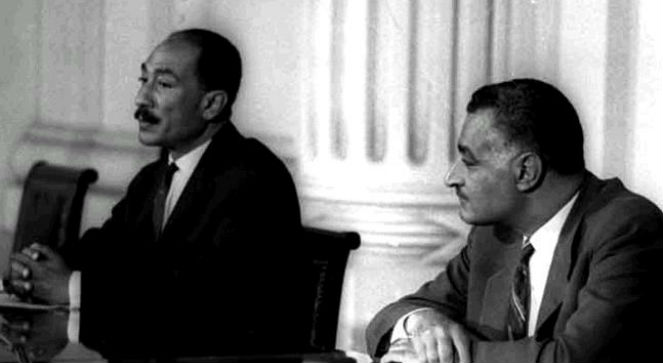 Rządy Anwara Sadata (1970-1981). He was succeeded by Anwar Sadat, who was aware, that only a modern state can be a worthy enemy to Israel. He began with the reform of the power apparatus and the central planning of the economy. Soviet advisers left Egypt, there was still the problem of relations with Israel. Together with Syria and Jordan 6 October 1973 r. Egypt attacked Israel (Yom Kippur War) in Synaj. The surprise was so great, that initially the Israeli troops began to retreat. And although they soon went on the offensive, the war entered the negotiation phase, and Egypt regained territories east of the Suez Canal.
Rządy Anwara Sadata (1970-1981). He was succeeded by Anwar Sadat, who was aware, that only a modern state can be a worthy enemy to Israel. He began with the reform of the power apparatus and the central planning of the economy. Soviet advisers left Egypt, there was still the problem of relations with Israel. Together with Syria and Jordan 6 October 1973 r. Egypt attacked Israel (Yom Kippur War) in Synaj. The surprise was so great, that initially the Israeli troops began to retreat. And although they soon went on the offensive, the war entered the negotiation phase, and Egypt regained territories east of the Suez Canal.
After the end of its operations, Sadat made significant political reforms: censorship was abolished, political prisoners were released, some parties were allowed to vote (including the Association of Muslim Brothers). The so-called open door policy contributed to the rapid economic development of the country. The middle class grew richer, but at the expense of the poor. Sadat realized, that it cannot overcome the impending crisis without the help of international organizations.
When subsequent wars did not bring results, with the encouragement of Western and US politicians, Egypt signed a peace treaty with Israel at Camp David, which allowed for the opening of the country to modern, western technologies, however, most of the money was drowned in the quagmire of Egyptian corruption. Uneven development of the country, the wealth of dishonest businessmen and officials as well as the impoverishment of the poor have spurred an increase in sentiment favoring Islamic fundamentalists.
In September 1981 r. arrests of members of Islamic organizations began, also for students, as a result of which almost arrested 1,6 thousand. people. Sadat is dead 6 October 1981 r. in an attack organized by radical Jihad militias, an organization opposed to the peace negotiations with Israel. Hosni Mubarak became the president, which assassination attempt on Sadat he used to crack down on Islamic radicals.
Mubarak's reign (from 1981 r.). Sadata's economy was in a deplorable state. Population growth with a simultaneous decrease in the acreage of arable land threatened with starvation or further indebtedness abroad. If not for the US help, the crisis would be unimaginable. Even though almost half of Egyptians today live off their farm work, the economy is based on oil, fees for using the Suez Canal, tourism and work of citizens abroad. Gulf War, in which Egypt backed the countries of the anti-Iraqi coalition, harmed Egyptian tourism, but the real losses were brought by attacks on tourists. After the attack in Deir cl-Bahari, almost all global travel agencies canceled their holidays overnight. Repeated attacks and widespread corruption prevent most Egyptians from reaching a higher standard of living than in Nasser's time. This mainly applies to the rural population, which lives almost on the level of the pharaohs. The Fellachs cultivate the land extensively. Although in Egypt there are two or even three harvests a year, even though cereals are grown (wheat, rice, corn, sorghum or barley) and cotton, sugar cane, date palm, vegetables and fruits – some food comes from abroad. Agriculture is unprofitable, and the cultivation of the newly developed lands consumes great sums, hence the escape of the suburban poor to the cities and the sale of arable land to developers, who build the poor, primitive neighborhoods. Cairo is growing rapidly, reaching estimated 20 min residents (additionally approx. 5 min commutes here every day to work). Although many investments have been made in recent years, the gap between the poor and the middle class remains the same.